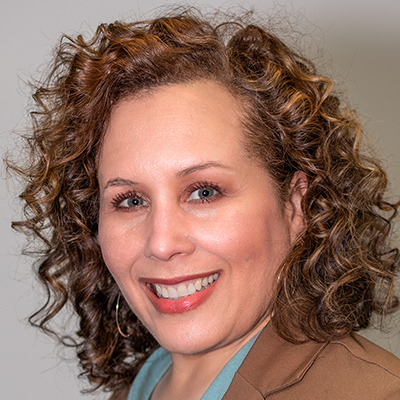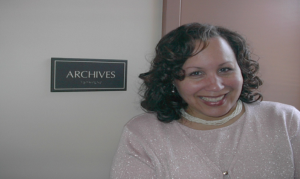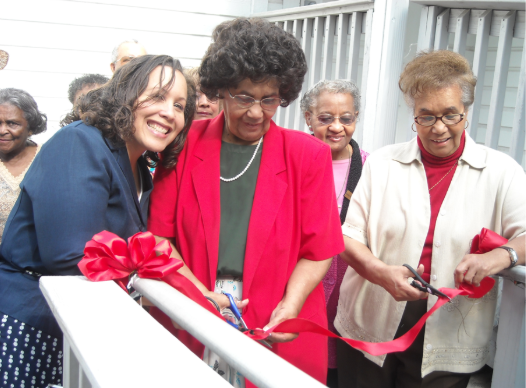Commissioner Interview: Dr. Joni Floyd
Dr. Joni Floyd spoke with MD Two Fifty about her family history, her experience as a community activist and public historian, and her work as the Maryland & Historical Collections Curator at University of Maryland University Libraries.

By Mary Zell Galen, Programs and Partnerships Specialist
Dr. Joni Floyd serves in one of two seats appointed by Speaker Adrienne Jones on the MD Two Fifty Commission, representing University of Maryland University Libraries.

“I owe who I am to how I was raised”
Describing an idyllic childhood neighborhood, Floyd is from the Queenstown area of Severn in Anne Arundel County. As the youngest of eight children, she was raised in a household that highly valued education and service. Her grandparents provided land to construct a Rosenwald School in their community, and many relatives served in local leadership roles.
Floyd is the descendant of Queen Mary, a free woman of color born near the Popayán Province in South America and later taken as an indentured servant to Maryland. Some of her descendants were later enslaved but filed suits with courts in Maryland and the District of Columbia in 1796 and recovered their freedom. While Floyd learned of this history later in life, it continues to shape her trajectory today.
Floyd earned her bachelor’s degree in literature from American University. As a student, she joined an academic honors and community service program where she provided support for Salvadoran middle school students who had were former child soldiers. She next earned her doctoral degree in English from UCLA. She taught in an academic advancement program, where she provided support for first generation college students and helped them feel comfortable with the college experience.
“A legacy of self and service”
While teaching at Springfield College, she learned from her Aunt Sylvia about plans to redevelop Wiley H. Bates High School, Anne Arundel County’s high schools for African American students from 1933 to 1966. Sylvia Gaither Richardson Garrison, Floyd’s aunt, graduated from the school, became a teacher at Wiley H. Bates High School, studied at the Sorbonne as a Fulbright Scholar, and served as the first female president of the Severn Improvement Association. Alongside Aunt Sylvia, Floyd worked with Anne Arundel County to list the Queenstown Rosenwald School on the National Register of Historic Places in 2009 and transform it into a community resource. Following her experiences protecting the Queenstown school, Floyd served as the Wiley H. Bates Legacy Center’s first director honoring the history of the county’s African American students.
Advancing her career as a community historian, Floyd later became the director of the Banneker-Douglass-Tubman Museum (BDTM). She worked to produce a documentary about advocacy efforts to save Mount Moriah AME Church and transform it into the BDTM. Along the way, she continued Aunt Sylvia’s legacy of community advocacy. Many of her relatives and other Queenstown residents historically worked as truck drivers but faced new local regulations preventing them from parking trucks in the neighborhood. Floyd collected oral histories from elderly residents and was able to win an appeal grandfathering in truck parking for residents, documenting truck driving as a historic profession in Queenstown.
Now working for the University of Maryland University Libraries, Floyd serves as the Curator of Maryland & Historical Collections. She works to find new records to fill in gaps in the library’s collection. For example, while the library holds the papers of Spiro T. Agnew, Floyd wants to put those records in conversation with documents from the Prince George’s County PTA or the League of Women Voters. She also serves on the advisory board of the 1856 Project, UMD’s chapter of Universities Studying Slavery consortium.
She reminds readers that UMD libraries are here for you! The library’s special collections are available for both students and community members. The public can access the library’s collection of historic newspapers and genealogical records, and work in the library’s building when completing research.
“USA citizenship is a verb”
Floyd is proud to serve on the MD Two Fifty Commission. She deeply values the rights granted to US citizens, including the choice to seek education, the opportunity to engage in the political process, and the freedom of religion. She believes American citizenship is like any other relationship one values, which should be a mutually beneficial relationship that requires effort and evolves over time.
As the 250th anniversary approaches, she expresses empathetic concern for individuals who feel disillusioned about the semiquincentennial festivities. She hopes to use her platform as a commissioner to meet people wherever they might be. She believes commemoration is not only about celebrating other people, but it can serve as an opportunity to document your community, highlight unsung heroes that made a difference in your life, and your share stories across Maryland.

Dr. Joni Floyd at a ribbon cutting ceremony at the Queenstown Rosenwald School.